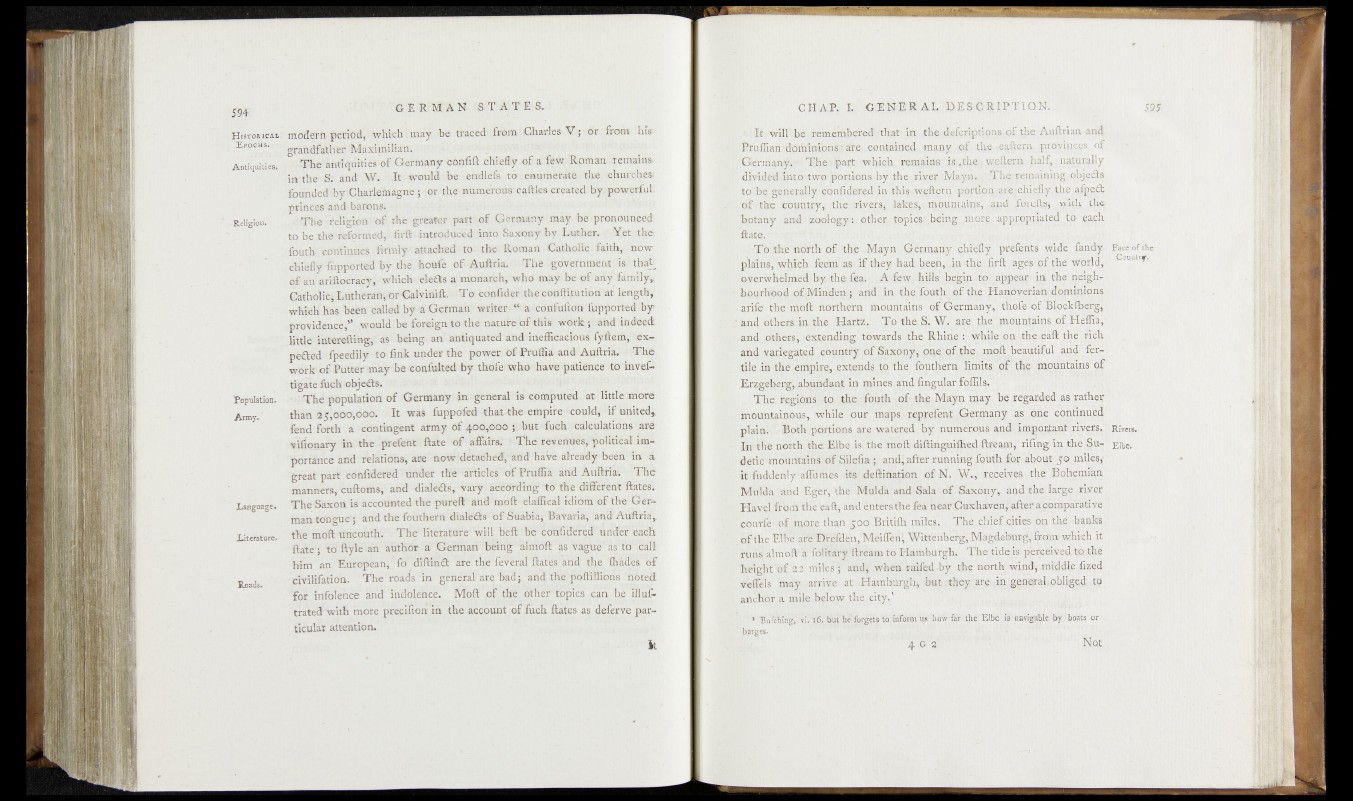
H isto rica ï.
(Êi ccS®.?. *
Antiquities,
Religion, :
^Population.
Army.'
Language-,
Literature,
Roads.
be t r a c e d §p|f
grandfather Maximilian.'
T h e antiquities o f Ge rm an y confift chiefly o f a^fewiRoraan lemains
in the S. and W . It would be endlefs to enumerate the churches-
founded by C h a rlem ag n e p:i or-the numerous cafties'created by. powerful,
princes and barons. :
T h e religion o f the greater p a rt o f G e rmany may be pronounced
to be the reformed, ■ lirft introduced into' Saxony: b y Luther. Yet the
foüth -ccjiitinries fftmly "attached to the Roman Catholic faith, now
chiefly lupported by the houfe of- Auftria. T h e government is thaf,
o f an ariftocracy, which elefts a monarch, who may be o f any family,
Catholic, L utheran,:b rjGalvinift. T 0 -confulcr the co rifti^ tio n at length,
which has befen nailed by a G e rm a n ''w rite r “ a confufiou lupported by
providence,” would be foreign.to th e nature o f th is w ork ; and -indeed!
little in te re ftin g f as beihg a n anti<|üàted àndiïüefiââsîbeâf fÿftém, -'éx-
pééféd fpeedily to- fink u n d è ï th e power M-'Pmffia and- Auftria, 4 T h é
w b fk o f Putter -may be eoafulted by th d fd w h o havé’ -patiénee h o 'in v e f i
tigàte fiich objeâs. -
• 9 Thé pOptilâtion o f Germany in geaeral is G'onÿptlted at • llttlflih o ré
than 2 000,000. It was fuppofed -th a t-tlie -e to p ire -^o o u ^ ■ i f u nited,
fend forth a contingent army Of 400,-000 £ but-Tuêhi teâlcnlàtidpisKàî'e
vifWary in the prefcht ftate o f affairs." ‘'T h e revenues,-'political.importance
and relations, ate now ‘detache<f,‘ a n d h i f e . a k e ^ ÿ 'i ô é d ^ ^4
great p a rt confidered unde r th e f articles o f P ruflia and Auftria. T h é
manners, cuftoms, and dial efts, ■ v ary a c c o rd in g 'to the different liâtes.
The Saxon is accounted the pureft and moft claflical- idiom o f th e G e rman
tongue-; and the fouthern dialedfs -' o f Suabia, Bavaria, .and Auftria,
the moft uncouth. . T h e literature will beft b e : cönfidered under each-
ftate ; to’ ftyle an author a German being alnioft as vague-; âs? to call
him an European,.ffo diftinft are thé feveral ftates and the fliades o f
civilifation. T h e roads in general are bad ; and th e poftillionë noted
for infolence and indolence. Moft o f thé o th e r topics can be illuf-
trated'wit-h more precifioh in the account of fuch ftates as defervé particular
attention.
k
595
It will be remembered th a t in the. defc^fiptions of the Auftrian and,
Pruflian dominions. - are contained many o f tftf, icaftern provinces of
Germany. - The-' .part- which remains’ is: .the; weftern half, naturally
divided into: two portions b y the riv e r: Mayn. ' /Th,e< remaining objefts
to .be generally confidered in this weftern portion’!are( chieflyvthe afpeffc
o f the country, the rivers, lakes, mountains, and .forefts, with the
botany and;! .zoology :: other topics being ...more appropriated to each
fta te .’
T o the north o f the M ay n Ge rmany chiefly prefents wide fandy- Face o f the
plains, which feem as if they had been, in the firft ages of the world $ iy"‘
overwhelmed by the fea. A f e w ’hills begin to. appear in-.the npigh-
- .b o p rb f^ g ^ pM in d en and in the fouth ^ f th e Hanoverian dominions
arife the*-mil# - northe rn lM<fcrttaihs o f G e rm a n ^ ^ n o ^ '^ o f Btockfherg,
; arJdhQtber&.m 'Tfertz:., T q the mountains o f Hp {flap
and .others, 'extending towards ,the Rhine : .the.paft the rich
and variegated ^country o f Saxony, pne o fB m . mqft beautiful and ffrutile
in the empwe,. extend^ to tl$& M ith em lim its o f t the-, mountains o f
,Er?gehepgj^hHnflaxft in rpines.a'rfd fingtd^rTqdys." -v
. The rpgib'ns.Ao th e fouth ,q f thg»Mayn may be regarded ns rathqi*
mountainous, v While ou-r maps, reprefenf i<2,er,many continued
plaim Both portions are watered b y >numeai©jis and impomtan-t riye^^'^Rirt«»
In the"north th e Elbe is;the m o ft dd-ftinguilhed.ftream,>rftmg; in ^ h e ,Su-^ Eibt.
'mountains .of S ilefia; andjjafter ru n n in g fouili- fo i -about^.Q.^iles^
it fuddc.nly-affumes its deftination o f N . W ., receives the Bohemian
Mulda and Eger, the Mulda and Sala o f Saxony, and the. large river
Hav el from-the eaft, and enters the fea near C uxhaven, after a comparative
I courfe- o f more than j'o o Britifh miles. T h e chief cities on the banks
o f the Elbe' are Drefden, Meiffen' Wittenberg, Magdeburg, frdm which it
runs aim oft a; folftary ftreani to Hamburgh. T h e tide is perceived to the
h eight o f 22 m i l e s a n d , when railed by the north wind, middle fized
veflels may arrive; at H am b u rg h , but: .they are in generabqbliged to
anchor a mile below the city.*
A "Bivfching, :
.barges’.
A 16,'- b'ut he forgets tû inform its how far'the Elbe is navigable by boats or ,,
4 g V V ? * 1 N q|
■ ■ ■ Q i